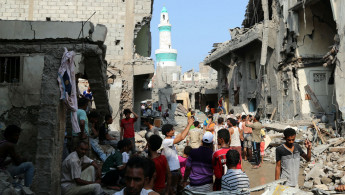Iran violated Yemen arms embargo: UN
A UN report found that Iran violated an arms embargo after failing to block supplies to Yemen's Houthi rebels.
2 min read
More than 8,750 people have died in Yemen's war [Getty]
Iran has violated a UN arms embargo by failing to block supplies to Yemen's Houthi rebels of ballistic missiles that were fired at Saudi Arabia, according to a UN experts' report seen by AFP on Friday.
The finding is expected to bolster accusations from the US and Saudi Arabia that Iran has supplied weaponry to the Houthis in their war against the Saudi-led coalition.
"The panel has identified missile remnants, related military equipment and military unmanned aerial vehicles that are of Iranian origin and were introduced into Yemen after the imposition of the targeted arms embargo," said the report presented to the Security Council.
"As a result, the panel finds that the Islamic Republic of Iran is in non-compliance with paragraph 14 of resolution 2216" that imposed the ban on arms sales to Yemen in 2015, said the 79-page report presented on Tuesday.
Iran has strongly denied arming the Houthis and last month accused US Ambassador Nikki Haley of presenting "fabricated" evidence that a November 4 missile fired at Riyadh airport was Iranian-made.
Haley told the Security Council last month that the United States will push for action against Iran for providing missiles that have been fired at its ally, but Russia quickly signalled that it would not endorse such plans.
While the experts pointed to the Iranian origin of the missiles, they were unable to identify the supplier and stressed that Iran had failed to provide information to the panel.
Iran "failed to take the necessary measures to prevent the direct or indirect supply, sale or transfer of Borkan-2H short-range ballistic missiles, field storage tanks for liquid bio-propellant oxidizer for missiles and Ababil-T (Qasef-1) unmanned aerial vehicles to the then Houthi-Saleh alliance," said the report.
The UN experts travelled to Saudi Arabia in November and again last month to inspect the remnants of missiles fired by the Houthis in May, July, November and December.
A Saudi-led Arab coalition intervened in Yemen to fight Houthi rebels in March 2015.
More than 8,750 people have died in the conflict and the country is facing what the United Nations has described as the world's worst humanitarian crisis.
The finding is expected to bolster accusations from the US and Saudi Arabia that Iran has supplied weaponry to the Houthis in their war against the Saudi-led coalition.
"The panel has identified missile remnants, related military equipment and military unmanned aerial vehicles that are of Iranian origin and were introduced into Yemen after the imposition of the targeted arms embargo," said the report presented to the Security Council.
"As a result, the panel finds that the Islamic Republic of Iran is in non-compliance with paragraph 14 of resolution 2216" that imposed the ban on arms sales to Yemen in 2015, said the 79-page report presented on Tuesday.
Iran has strongly denied arming the Houthis and last month accused US Ambassador Nikki Haley of presenting "fabricated" evidence that a November 4 missile fired at Riyadh airport was Iranian-made.
Haley told the Security Council last month that the United States will push for action against Iran for providing missiles that have been fired at its ally, but Russia quickly signalled that it would not endorse such plans.
While the experts pointed to the Iranian origin of the missiles, they were unable to identify the supplier and stressed that Iran had failed to provide information to the panel.
Iran "failed to take the necessary measures to prevent the direct or indirect supply, sale or transfer of Borkan-2H short-range ballistic missiles, field storage tanks for liquid bio-propellant oxidizer for missiles and Ababil-T (Qasef-1) unmanned aerial vehicles to the then Houthi-Saleh alliance," said the report.
The UN experts travelled to Saudi Arabia in November and again last month to inspect the remnants of missiles fired by the Houthis in May, July, November and December.
A Saudi-led Arab coalition intervened in Yemen to fight Houthi rebels in March 2015.
More than 8,750 people have died in the conflict and the country is facing what the United Nations has described as the world's worst humanitarian crisis.





 Follow the Middle East's top stories in English at The New Arab on Google News
Follow the Middle East's top stories in English at The New Arab on Google News


![22 Arab countries at COP29 have rejected the targeting of fossil fuels [Getty]](/sites/default/files/styles/image_330x185/public/2024-11/GettyImages-2184289638.jpg?h=199d8c1f&itok=ptHl5bec)